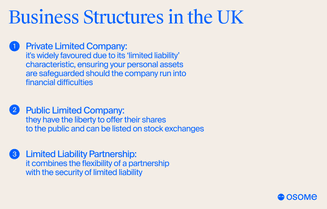A Complete Guide to a Private Limited Company in Hong Kong
- Modified: 23 December 2024
- 14 min read
- Starting a Company


Jon Mills
Author
Jon's background is in copy and content writing for brands. He relishes writing educational and entertaining content. He's told unique stories in creative ways, and has added value to products in the luxury sector. Now, his stories bring the advice and journeys of Osome's accounting experts and small business owners to life, hoping to inspire entrepreneurs to be ambitious, set their sights high, and take pride in their growing businesses.
A Hong Kong Private Limited Company has many strengths. Its limited liability allows easier capital raising and tax benefits. These private companies also offer stability and protection for small- to medium-sized businesses. Is this the right business structure for you? Let's explore the benefits for small- to medium-sized businesses operating as private companies in Hong Kong.
Key Takeaways
- A private limited company in Hong Kong offers limited liability protection to its shareholders, meaning that their personal assets are shielded from the company's debts and liabilities.
- Incorporating a private company in Hong Kong is straightforward and requires minimal bureaucratic hurdles. The city's business-friendly environment and efficient government services make it an attractive destination for entrepreneurs.
- Private limited companies in Hong Kong typically have a hierarchical corporate structure consisting of shareholders, directors, and a company secretary. Shareholders own the company, directors manage its operations, and the company secretary ensures compliance with regulatory requirements.
What Is a Private Limited Company?
A Private Limited Company is a private company limited by shares. It operates as a legal entity and can conduct business while benefitting from various advantages.
These private companies may also be called a "PVT LTD" in the Companies Registry. However, remember that "Ltd" and “Limited" are not interchangeable according to section 102 of the Hong Kong Companies Ordinance. If you are registering an English business name for your PLC, it must end with the word "Limited."
Need assistance with company registration? Our expert team can guide you through the process to ensure compliance with all relevant regulations and requirements.

“Private companies limited by shares” implies that business owners possess shares in the company. Multiple shareholders can jointly own the entity, or a single owner can claim 100% ownership. The ownership percentage determines how much dividend income each shareholder is entitled to.
What Is Limited Liability for a Hong Kong Company?
The private limited liability structure excludes the owners from financial liabilities incurred from company debt. Personal resources or assets of the shareholders of such an entity remain unaffected in the case of bankruptcy or debt collection. Only resources owned by the entity can be confiscated by authorities.
This is because directors carry out duties as company agents and are unassociated with personal financial status. Therefore, PLC shareholders are legally protected from losing their savings or investments. Instead, their company stocks in the private liability company will be used to cover any damages, which is not the case with a Hong Kong Sole Proprietorship.
When a Hong Kong company is not legally registered, anybody undertaking a director's roles, duties, and decision-making is considered a “de facto” Director. According to the Hong Kong companies ordinance, de facto Directors are usually considered the same registered Directors.
Finally, the protection of personal assets is negated in the case of fraud. The courts have the prerogative to use an individual's assets to recover debts if an owner is complicit in the knowledge of fraud.
Advantages of a Private Limited Company
With a Private Limited Company, your business's financial obligations are independent and only belong to the legal entity itself. Having a private company limited by shares means you never need to pay with your money unless there is fraud. Your company is considered a separate legal entity and protects you from business liabilities.
In contrast, if sole proprietors or partners in a General Partnership private company face business failure, their personal assets will be levied to cover any debts. Therefore, small private companies without a limited liability structure are often more vulnerable.
Example
Ben's company develops an app for Google Play. This app infects users with malware, and Google sues Ben's business. The court rules Ben must compensate affected users. The company can't afford it and goes bankrupt. Ben doesn't. He gets to keep his house, his car and even his collection of rare butterflies. If Ben were a sole proprietor, all those assets would be sold to pay for the compensation.
A Hong Kong private limited liability company also provides foreign entrepreneurs with enhanced agility.
A foreigner or foreign business entity can own 100% of a Hong Kong private ltd company, whether the Hong Kong entity is independent or a foreign business subsidiary. While other business entity types are also available for those overseas hoping to explore the Hong Kong market, their opportunities are more limited compared to a private company.
Nonetheless, a Hong Kong Private Liability Company's most significant advantage is its ability to generate unlimited profits, gain capital, and engage in activities as a separate legal entity.
Example
Sam's Interior Design PLC decorates apartments in France. He wants to expand to Hong Kong and open a Private Limited Company there. He finds investors and engages in another activity in Hong Kong: landscape design.

Limited liability for the shareholders
In a Hong Kong private limited liability company, a shareholder's financial obligation is proportional to their share amount. This provides more security to investors since they only risk losing what they've already invested. Unlike in the case of a General Partnership, for example.
Example
Sam, Ann, and Helen started an interior design Private Limited Company together. Each of them owns HK$ 1,000 worth of shares. The business runs into debt of HK$ 30,000. “I told you not to trust that designer," says Jason. The company goes bankrupt, and Jason, Ann, and Dan lose HK$ 1,000 each. Had the three of them set up a general partnership, Sam, Ann, and Helen would all have been legally obliged to pay the whole sum of the debt.
Better public perception
The risks involved in sole proprietorships often make seeking financial support tricky, as investors tend to be less confident. Meanwhile, Private Limited Company is more credible and is thus taken more seriously by investors.
Example
Sarah is the Sole Proprietor of Goga Company. Due to the slow economy, she's facing some cash flow issues, so she is trying to get a loan from the bank. As her company is relatively unheard of, her application for a loan was rejected. Her brother Jeremy—who owns a legally registered Private Limited Company—could easily get a bank loan.
Perpetual succession
Another advantage of a Private Limited Companyis that it can operate as usual even in the event of a change of membership. The day-to-day operations face minimal disruptions if it's a Private Limited Company.
Example
Janet has decided to resign from her position as Chief Operating Officer. After evaluation, the company has concluded that Frank should take over due to his capability. In this way, there is perpetual succession for the Private Limited Company.
Ease of raising capital
A Private Limited Companycan raise capital for business expansion by selling entity shares. The ease of funding, whether through the involvement of new shareholders or the issuance of more shares to existing shareholders, facilitates investing for growth.
Example
Stefano has been running his business for two years and is looking to expand. He roped in Larry as a new shareholder and easily raised the required capital.
Easy transfer of ownership
Ownership of a Private Liability Company can be completely or partially transferred by selling all or a sum of its total shares or issuing new shares to new investors. The advantage of this straightforward legal process is that operations continue without interruption.
Example
Kate is looking to retire and wants to pass on her Private Liability Company to her son. In this case, she heads over to a law firm to complete the transference of the entity's shares.
Tax benefits and incentives
Another advantage of Hong Kong Private Limited Company owners is the attractive tax benefits in Hong Kong. Corporate tax (profits tax) is capped at 16.5% of assessable profits. As Hong Kong has a territorial basis of taxation, only profits yielded from Hong Kong are subject to tax. There is also no capital gains tax, sales tax, or VAT, and no withholding of tax on dividends in Hong Kong.
Example
Sharon owns two companies, one in Hong Kong and one in Taiwan. She makes a profit margin of 30% from the two companies. She only pays 16.5% tax on the profits from the Hong Kong company, as Sharon's other business is based in Taiwan.
What Are the Disadvantages of a Private Limited Company?
The setup procedure
The cumbersome setup process could be considered a disadvantage. This entails successfully registering your business and submitting all relevant supporting documents and financials. You also need to apply for a Certificate of Incorporation and your Business Registration Certificate to prove your tax compliance and legality.
Another setup requirement is to supply details on the company in the form of Articles of Association, meeting all employee, shareholder, and director requirements.
Getting paid
Removing cash from a Hong Kong Private Limited Company is more complicated than from a Sole Proprietorship.
With a private company, directors and business owners can't use the entity as a personal source of income. It has to be legally transferred and paid out as a dividend or a salary. You'll need to register for PAYE when setting up your Private Liability Company, drawing a salary from your monthly payroll.
Legal requirements and maintenance
You must comply with the Hong Kong Companies Ordinance, which outlines and monitors your Limited Liability Company's operations requirements. A Company Secretary is the official in charge of ensuring there are no violations that could lead to fines or even business closure.
Complicated striking off
If your Limited Liability Company was registered but didn't actually start operating, you can deregister or wind up the entity relatively easily.
On the other hand, striking off an existing company that has been operating for some time can be lengthy. The process can take several months to effectively close the business account, liquidate and distribute assets, and pay all dividends or debts due.
Hong Kong Private Limited Company Registration
Follow these steps to register a private company in Hong Kong.
1. Choose your company name
Choosing the right name for your Private Liability Company is a vital step. Here are a few requirements to form a Private Limited Company in Hong Kong:
- A Hong Kong company can have an English or Chinese name, but the name cannot have both English words/letters and Chinese characters
- English business names must end with the word ‘Limited'.
- Chinese-names businesses must end with “有限公司”
You can find all the requirements in the Guideline on Registration of Company Names for Hong Kong Companies.
2. Complete the business registration process
Complete your registration with the Hong Kong business registration office. Registering a Hong Kong limited company is fairly simple and easy to complete online. Just make sure you have the following items ready:
- the confirmed company name
- a local Hong Kong address to use as your registered office address
- a Hong Kong-based natural person or entity as your company secretary
- at least one company director. The director must be different from your company secretary
- a local business account
More specific guidelines and requirements are in the Hong Kong business registration ordinance. If you're unsure about the process, Osome has a team of professionals who can help you acquire your business registration certificate.
3. Incorporate your company in Hong Kong
Every Private Limited Company needs at least one or more registered shareholders who may or may not be Hong Kong residents. Shareholders can be a person, legal entity, liquidator, or sole proprietor. In compliance with Hong Kong law, the issuing of new shares in a Private Limited incorporated company involves:
- Allotment of its shares to specific individuals by Directors;
- Shares are issued only after the register of shareholders has been supplied with the relevant information;
- Allotment of other shares requires the prior approval of Shareholders in the annual general meeting (AGM);
- Shareholders may approve each allotment individually or in general;
- If not revoked earlier, shareholder approval becomes valid at the next AGM;
- One month after the allotment of shares, the Return of Allotment of Shares (Form NSC1) must be filed with the Registrar of Companies;
- NSC1 identifies members and their shares, and allotments may be made on one day or across a period of time (within one month).
Shareholders may form a management team and a board of directors with the following titles.

The Management Team | A Board of Directors |
|---|---|
| Chief Executive Officer (CEO) | Inside Directors: Work for the organisation daily |
| Chief Financial Officer (CFO) | Outside Directors: Make unbiased decisions |
| Chief Operations Officer (COO) |
4. Prepare your documents
When all those requirements are met, you must submit the documents below to the Companies Registry and pay any upfront registration fees. You can do it via an online registry, a special “CR eFiling” mobile app, or a hard copy form.
- Incorporation Form - Form NNC1
- A copy of the company's Articles of Association
- A Notice to Business Registration Office (IRBR1)
5. Obtain other permits and licences
Depending on the nature of your business, you may require a business permit or license to operate. Financial Services Providers, Employment Agencies, Travel Agencies, Event Management Companies, Restaurants, Retail Stores, and Education Businesses are some of the main types that require a permit or licence.
Any existing permits or licences under a Sole Proprietorship cannot be transferred, so you'll need to reapply when setting up a Private Limited Company. You need to do this within a month of registering and can expect to wait between 2 and 8 weeks for permits to be received.
What Does a Private Limited Company Need to Function?
- At least one Shareholder. Maximum is 50. Both individuals and companies can own shares. The minimum paid-up capital is HK$ 1. You can pick another currency and invest 1 Euro, 1 Yuan, etc. This means an organisation can only issue 1 share worth HK$ 1 and it will work just fine.
- At least one Director. Unlike in Singapore, Malaysia, or Indonesia, Hong Kong does not require you to have at least one director who si local. As the business owner, you can be the only Shareholder and Director.
- Company Secretary. This can be a Hong Kong-based natural person or a local business organisation who can legally serve as a company secretary. They maintain the business's statutory books, records, and registries while ensuring compliance with all reporting requirements.
- If you are the only Director & Shareholder, you can't also be the company secretary.
- Keep an eye on the Significant Controllers Register (SCR). A list of people and companies that control the business (ultimate beneficial owners): Those that hold more than 25% in shares, those that make changes to the board of directors, etc.
- Pay tax. The Hong Kong business profits tax is calculated through a two-tiered rate system introduced in 2018. A company pays 8.25% on assessable profits up to HK$ 2 mln and 16.5% on anything over HK$ 2 mln. It is crucial for any company conducting business in Hong Kong to stay compliant with the Inland Revenue Department. Therefore, it's best to hire a professional accounting firm like Osome to help you stay ahead of tax requirements.
Private Limited Companies Could Be The Way Forward For You
If you are ready to expand your business footprint in Hong Kong, a Private Limited Company may be your most suitable company structure. You benefit from the protection and stability of a private limited company in Hong Kong instead of a sole proprietorship, a general partnership, or even a public company. Limited liability companies protect your personal assets and separate you from your company entity. Therefore, you are not personally liable for any debt the business may incur.
Furthermore, a Hong Kong private limited company also makes it easier for you to acquire assets. Since shareholders share capital proportionally while having their personal assets protected, they are often more willing to make an investment.
Let Osome make your life easier
Let Osome make your life easier. When you start your business journey, you want all the help you can get. If you have a business question that needs answering, contact one of Osome's expert accountants. We are experts when it comes to working with Hong Kong's Inland Revenue Department.






